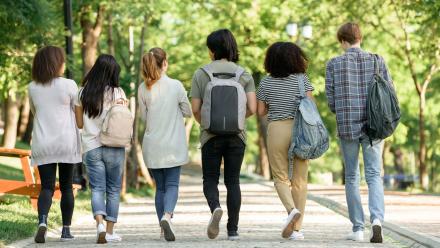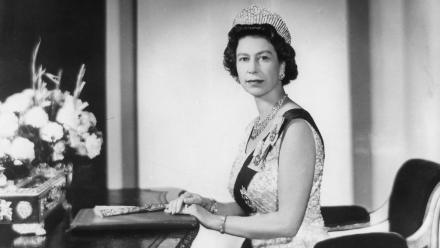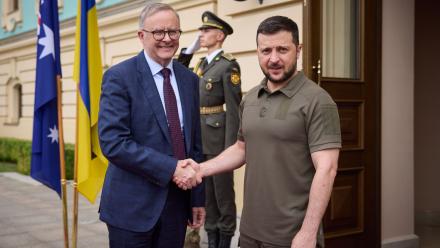How to renew a damaged world
COVID-19 has been especially consequential because it has convulsed a world already undergoing profound change and disruption
The policy choices Australian governments make in this difficult time will determine the country's future direction for years to come, Richard Maude writes.
Like the rest of the world, Australia is still grappling with the ravages of COVID-19. Charting a path out of the pandemic - towards economic, social, and even individual recovery - is our highest priority.
But how do we get there?
This is the focus of the 2021 ANU Crawford Leadership Forum (ACLF) kicking off at The Australian National University on Monday, which brings together some of the best and brightest from across Australia and the globe to discuss the challenge and opportunity of renewal, at home and internationally.
New variants and the seemingly never-ending cycle of lockdowns dramatically underline the difficult, long-term challenge of learning to live with COVID-19.
Major economies are growing again but prospects for global economic renewal as a whole are fragile, uncertain and uneven, partly because of unequal access to vaccines and doubts about the future path of the pandemic.
In the developing world, tens of millions of people have been pushed into poverty. The pandemic is leaving deep scars beyond its immediate health impacts - unemployment, inequality, the loss of human capital, and businesses closures.
In all countries, COVID-19 is causing long-lasting, devastating damage to the employment, mental health, and hopes for the future of young people.
COVID-19 has been especially consequential because it has convulsed a world already undergoing profound change and disruption.
Beyond its borders, Australia faces the end of certainty - a radically transforming a world described last year by Prime Minister Morrison as poorer, more dangerous, and more disorderly.
The post-war international order continues to unravel, challenged by China's growing power, increasingly widespread nationalism and illiberalism, and pushback against globalisation.
US-China relations are dangerously tense and confrontational. Technology is a new battleground as each seeks to reduce its reliance on the other.
We are not yet in a new Cold War, but we are witnessing a hardening separation between the world's autocracies, especially China, and the democratic world.
Our planet continues to warm to dangerous levels, our efforts to slow this falling well short of the urgent step up in action needed.
At home, Australia's economy has demonstrated its underlying strengths, but we are witnessing a fraying national consensus on how best to live with the pandemic, a weaker, more divided federation and a public weary of the struggle.
It is difficult to imagine a more testing or consequential time in recent decades.
The policy choices - international and domestic - that Australia makes in the coming months and years will determine whether it thrives in volatility and shift to a sustainable future or muddle through, poorer and more divided over the long-term.
This year's ACLF seeks to illuminate and inform these big policy choices and challenges.
The stakes are high. But there is opportunity still to be seized if Australia focuses on the future - on renewal - even as it remains gripped in the day-to-day management of this crisis.
This will require Australia to do more to reinforce its resilience and re-discover an appetite for long-term planning and reform.
It requires us to ask ourselves if we are doing enough to support and give hope to the young people - our 'pandemials' - whose futures have been held hostage by the pandemic.
It requires clear-headedness and ambition about what the world needs to do on climate change and what policies Australia should take to this year's United Nations Climate Change Conference. Along the way, policymakers need to be tapping Australian business and scientific expertise to consider how we can better manage Australia's accelerating shift to clean energy.
The complexity of many of the foreign policy challenges demands a healthy public debate and contestability of policy options. This includes the ever-steeper challenge of finding a model of co-existence with a more authoritarian and nationalist China that protects national interests while allowing for cooperation on issues of mutual interest.
Or, indeed, the question of how to help Australia's neighbours rebuild their economies, or renew liberal democracy, or whether it is possible to re-invent multilateralism for a new age.
The idea of renewal will run across all these discussions and more at this year's forum, which will also cover the impact of COVID-19 in the Pacific, the future of nuclear arms control, Australia's growing partnership with India, and how Australia's should manage technological de-coupling between China and the United States and other democracies.
It's a challenging time. But with crisis comes renewal, and with renewal hope. At the ACLF, we want to help bring that hope to life.
Richard Maude is Director of the Crawford Leadership Forum at The Australian National University. He is also Executive Director of Policy at Asia Society Australia.
The 2021 ANU Crawford Leadership Forum runs online from 6-7 September.
This article is published in collaboration with Policy Forum, Asia and the Pacific's platform for public policy debate, analysis, views, and discussion and based in the ANU Crawford School of Public Policy.


